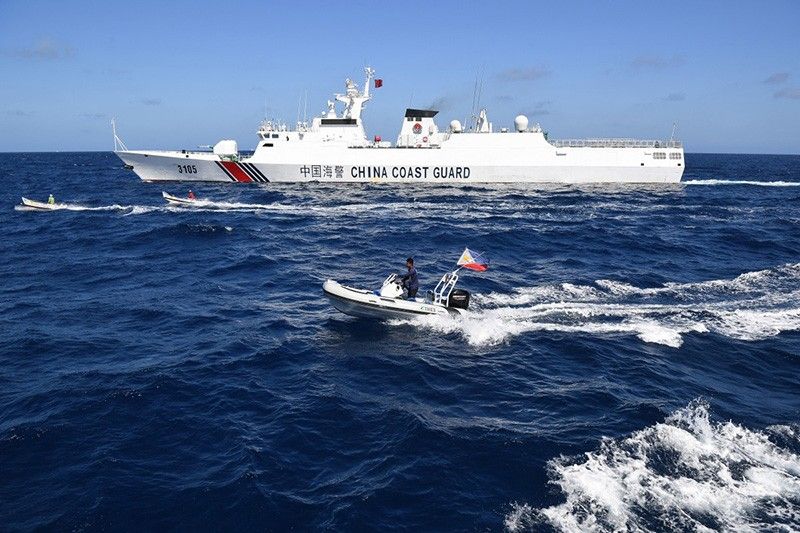Unraveling China's information warfare in Philippines

With the Philippine government’s recent transparency initiative in the West Philippine Sea, more and more Filipinos and countries all over the world are now aware of what’s happening in our side of the globe.
For many years, China has repetitively engaged in aggressive and coercive gray zone activities such as swarming, blasting of water cannon, and even forming blockades to invoke its expansive nine-dash line claim in the West Philippine Sea. Simultaneously, China has also been engaging in a massive information warfare to bolster its propaganda and push its narrative of ownership in the Philippine waters.
In 2023, the Marcos Jr. administration started publicizing China's gray zone operations in the west Philippine Sea through photos, videos and statements.
Currently, experts say the Philippines is winning the information warfare China initiated in our country. However, there is still a lot that needs to be done.
In an information warfare, China aims to ensure that foreign governments, including its political and business elites, journalists and civil society will accept its manipulated narrative and abstain from criticizing its actions and behaviors in their own country.
In a research paper I wrote for the Stratbase ADR Institute, I looked into various disinformation campaigns in the Philippines and in other parts of the world. My research shows that the campaign primarily starts with strategic political operators, who specialize in social engineering or manipulating and misrepresenting incidents, issues and public discourse to sway public opinion or public policy in favor of a specific interest or agenda.
In the case of China’s information warfare in the Philippines, these operators include Chinese political leaders and groups, who then connect with Filipino political leaders, media operators, and key opinion leaders to propagate their messaging.
The message is then sent to authentic and most especially, inauthentic, or fake social media followers and network, which further amplify China’s desired narrative online, until it reaches the general public, who, the operators hope, would voluntarily proliferate the message they initiated.
My study shows that from 2016 to 2022, China was able to successfully spread disinformation, influence and skew the Philippine foreign affairs, military, and economic policies to its favor, and propagate a benevolent image in the country while continuously conducting aggressive and coercive actions in the West Philippine Sea.
This was done with the help of pronouncements and policies made by political leaders, particularly former President Rodrigo Duterte, and narratives spread by co-opted media networks and journalists, pro-Duterte and pro-China bloggers, and troll armies.
The change in political leadership in 2022 brought a significant change in Philippine foreign policy. President Marcos Jr.’s pivot to a multi-polar world forced China to also adjust its disinformation campaign and turn heavily to inauthentic amplification with the help of Filipinos, who serve as Chinese proxies, propagandists, or political operators.
Authorities said some of these personalities present themselves as credible foreign policy and national security experts and even as legitimate journalists. China also continues to proliferate its messaging online through the Facebook pages of pro-China think tanks and influencers, and further propagated in various pro-China Facebook groups.
In 2023, the Philippines launched its transparency initiative, where the government publicized many maritime incidents happening in the West Philippine Sea through statements, videos and photos.
Furthermore, alongside the government’s efforts, legitimate security, and foreign policy experts, including academic institutions and think tanks such as the Stratbase Institute, and the diplomatic community have also been working together to defend the rules-based international order and Philippine sovereignty in the West Philippine Sea.
These actions brought about significant awareness among the Filipino public, media practitioners and even the international community of the gravity of China’s gray zone operations in the West Philippine Sea.
During a forum organized by Stratbase and the Embassy of Australia in the Philippines, Coast Guard Commodore Jay Tarriela said that China’s approach has become more intense and aggressive following efforts to bring transparency to the forefront. He noted that this this is “a clear indication that our transparency is making an impact in challenging their fake narratives.”
Surveys conducted in 2023 also showed the Filipino people’s low trust in China amid continuous gray zone activities in the West Philippine Sea, and the public’s increasing support towards the government’s actions to defend our rights in the West Philippine Sea.
While the Philippines is slowly reaping the positive impact of its transparency initiative, there is still a lot that needs to be done to ensure that we will retain the upper hand in this information warfare.
Security expert and founder of Project Sealight Col. Raymond Powell (Ret.) emphasized the importance of institutionalizing the transparency initiative to protect it from external pressures, whether from foreign actors, business interests, or bureaucracy, which can significantly impact policy integrity. He suggested writing down these policies is essential for ensuring their effectiveness over the long term.
Stratbase President Dindo Manhit suggested that the Philippines must embrace its middle power status, leverage on assertive transparency, and promote civil maritime security cooperation while leveraging the support of the international community.
Moreover, I believe that a whole-of-society approach is critical in addressing disinformation campaigns in the country. The government, with the help and support of the Filipino public, legitimate experts from think tanks and the academe, journalists, the private sector, and civil society organizations, must continue to utilize and proliferate the truth to counter China’s false narratives.
There is also a need to continuously educate the public about the Philippine territory and sovereignty. I urge lawmakers to pass a bill that will incorporate in the basic education curriculum the significance of the 2016 arbitral award and its importance to Filipinos. This will help instill nationalism and patriotism in Filipinos at a young age and will prevent them from being controlled and swayed by foreign information warfare.
The Philippines must steadfastly stand up and protect its sovereignty. We are in the right side of history and no amount of disinformation will change what is rightfully ours.
Joyce Ilas-Reyes is the communications and advocacy director of think tank Stratbase Group. Prior to joining the development sector, she has worked as a journalist.
- Latest




























